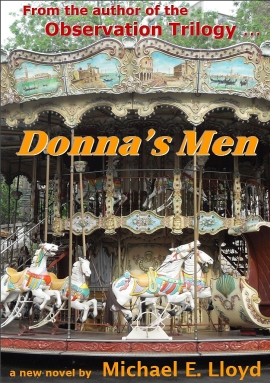Michael E. Lloyd, Donna’s Men
reviewed by Stefan Brenner

Donna’s Men Publisher: Bewildering Press, 2012 Length: 382 pp. Format: e-book (PDF) Price: $2.49 US |
Michael E. Lloyd’s latest novel comprises a trilogy of personal accounts linking the life of a middle-aged woman to those of two very different brothers. As the story unfolds, we gradually come to see that something from the past binds these characters in a way that they are each partially aware of, but none truly understands. Meanwhile, a single enigmatic character works quietly behind the scenes to offer one of them a key to the mystery, a key that will unlock the past, release the truth and open the door to long-held hopes and fears.
Book I follows the inner monologue of an unidentified woman, Donna, as she experiences a major existential crisis — an alcohol-fuelled episode characterised by self-pity and deception.
As she sinks deeper into a morass of hope alternating with despair, Donna’s every perception, thought and emotion is laid bare for us to analyse. While the external world is reduced to a series of architectural façades, Donna continues to act out her fantasies on an increasingly subjective, inner stage. And we quickly come to realise that even this account is not to be trusted. A lifetime devoted to artistic and literary obsessions is now paying the price: every bucket dipped into her inner well comes up filled with the dried-out thoughts and sayings of others.
Donna’s descent into subjectivity concludes in a dream-like “literary banquet” attended by congeries of her (mostly male) heroes. Rendered helpless by a surfeit of navel-gazing, ironically even the self-deluded Donna must eventually recognise that her hallucinatory experiences lack the authenticity craved by these “men.” And an act of “selfish kindness” (by yet another man) finally strips away the pretence and forces her to return to the ordinary world where, with luck, she can begin anew.
Book II offers another perspective on subjective truth and existence: the recorded thoughts and feelings of a young boy growing up in the “austerity” Britain of the 1950s.
Peter is an unhappy child: his twin sister died early and suddenly, leaving the bright little boy alone with a caring, but somewhat neurotic, mother and a practically-minded father and elder brother. Bereft of an empathetic male role-model, Peter retreats into a private world principally occupied with his own frustrations and alleviated only by the guidance he takes from the voice of his deceased twin, recorded in a secret diary.
Maturing more rapidly than her brother, Jane attempts to assist the precocious child as he struggles to come to terms with both his family situation and the challenges of an increasingly volatile adult world. The struggles and joys of youth, along with the evolving political and social scenes, are mirrored in the titles of contemporary popular music.
As he and we move into the 1960s, Peter starts to outgrow the pleasures and pitfalls of childhood. The shadow of his sister becomes literally marginalised, her appearances in Peter’s diary becoming more sporadic until, with Britain on the brink of a socio-economic revolution, he leaves the world of childhood behind and embarks on a solitary journey into manhood.
Peter’s testimony in Book II contrasts sharply with that of Donna: it is uncontaminated by the narrow cultural glosses that make the latter’s account so suspect. But the eye of the child does not approach the world in innocence. Instead, the latent tensions and prejudices inherent in every family are all too apparent in Peter’s commentary — skewing his assessment of the behaviour, decisions and choices of others.
This having been said, we are more inclined to take at least his introspective observations at face value: opportunities for self-deception must be minimal here. In the case of Peter’s early experiences, thoughts and feelings, to be is simply to be perceived. So his childhood diary offers us truth of a sort, albeit one that is narrow, partial and of limited value.
In Book III, the bigger picture swings into view. The narrative lens pans back as Donna, long recovered from her breakdown, encounters the recently retired Robert, Peter’s supposedly unsympathetic brother. The now-mellowed Robert has possession of his young brother’s diary and we are able to place its revelations into proper context, using the comprehensive family history supplied.
And it seems that Peter was probably the source of much of his own alienation: he is even more self-absorbed and self-centred than the average child. And it also seems he hasn’t changed much: having succeeded brilliantly at his academic studies, the multi-talented Peter has turned his gifts to the unproductive if profitable world of professional gambling.
Slowly but inexorably, Robert’s, Donna’s and Peter’s life-stories converge on a single event. A chance meeting, many years before, has created a shared destiny that none would have freely chosen. This event centres on a single name — “Catherine” — a name which has hitherto carried very different significance for each of them. The puzzle is eventually resolved, but is anyone now the better for that?
Donna’s Men is a complex, multi-layered work: part historical mystery, part literary and musical tribute, part social documentary, part exploration of the epistemology of testimony. In the absence of an omniscient narrator, successive embedding of the characters’ subjective accounts offers something akin to objectivity; but it is up to the readers, through active engagement with the text, to come up with their own interpretations of the principal protagonists and their personal relationships. In judging their actions and responses, we need to balance what we know with much that we do not, and perhaps this is the essence of the human condition.
In this cracking good yarn, Lloyd does not tell us what to think: instead, having shown us the way, he invites us to consider all the options and leaves the choices to us.
Copyright © 2010 by Stefan Brenner
The text of this review appeared originally in The Critics’ Corner of issue 405.

